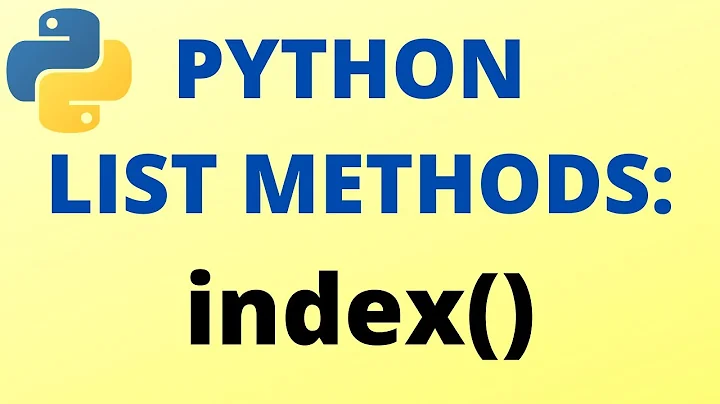Index all *except* one item in python
Solution 1
For a list, you could use a list comp. For example, to make b a copy of a without the 3rd element:
a = range(10)[::-1] # [9, 8, 7, 6, 5, 4, 3, 2, 1, 0]
b = [x for i,x in enumerate(a) if i!=3] # [9, 8, 7, 5, 4, 3, 2, 1, 0]
This is very general, and can be used with all iterables, including numpy arrays. If you replace [] with (), b will be an iterator instead of a list.
Or you could do this in-place with pop:
a = range(10)[::-1] # a = [9, 8, 7, 6, 5, 4, 3, 2, 1, 0]
a.pop(3) # a = [9, 8, 7, 5, 4, 3, 2, 1, 0]
In numpy you could do this with a boolean indexing:
a = np.arange(9, -1, -1) # a = array([9, 8, 7, 6, 5, 4, 3, 2, 1, 0])
b = a[np.arange(len(a))!=3] # b = array([9, 8, 7, 5, 4, 3, 2, 1, 0])
which will, in general, be much faster than the list comprehension listed above.
Solution 2
The simplest way I found was:
mylist[:x] + mylist[x+1:]
that will produce your mylist without the element at index x.
Example
mylist = [0, 1, 2, 3, 4, 5]
x = 3
mylist[:x] + mylist[x+1:]
Result produced
mylist = [0, 1, 2, 4, 5]
Solution 3
>>> l = range(1,10)
>>> l
[1, 2, 3, 4, 5, 6, 7, 8, 9]
>>> l[:2]
[1, 2]
>>> l[3:]
[4, 5, 6, 7, 8, 9]
>>> l[:2] + l[3:]
[1, 2, 4, 5, 6, 7, 8, 9]
>>>
See also
Explain Python's slice notation
Solution 4
If you are using numpy, the closest, I can think of is using a mask
>>> import numpy as np
>>> arr = np.arange(1,10)
>>> mask = np.ones(arr.shape,dtype=bool)
>>> mask[5]=0
>>> arr[mask]
array([1, 2, 3, 4, 5, 7, 8, 9])
Something similar can be achieved using itertools without numpy
>>> from itertools import compress
>>> arr = range(1,10)
>>> mask = [1]*len(arr)
>>> mask[5]=0
>>> list(compress(arr,mask))
[1, 2, 3, 4, 5, 7, 8, 9]
Solution 5
Use np.delete ! It does not actually delete anything inplace
In your example, "mylist[~3]" would be written like that: mylist.delete(3)
A more complex example:
import numpy as np
a = np.array([[1,4],[5,7],[3,1]])
# a: array([[1, 4],
# [5, 7],
# [3, 1]])
ind = np.array([0,1])
# ind: array([0, 1])
# a[ind]: array([[1, 4],
# [5, 7]])
all_except_index = np.delete(a, ind, axis=0)
# all_except_index: array([[3, 1]])
# a: (still the same): array([[1, 4],
# [5, 7],
# [3, 1]])
Related videos on Youtube
choldgraf
Updated on January 13, 2022Comments
-
choldgraf over 2 years
Is there a simple way to index all elements of a list (or array, or whatever) except for a particular index? E.g.,
mylist[3]will return the item in position 3milist[~3]will return the whole list except for 3
-
 DSM over 10 yearsI might use something like
DSM over 10 yearsI might use something likenp.arange(len(arr)) != 3as the mask, because then it can be inlined, e.g.arr[~(np.arange(len(arr)) == 3)]or whatever. -
Abhijit over 10 years@DSM: Please post this as an answer :-). Any case, I am not quite conversant with Numpy.
-
Bi Rico over 10 years+1 for masking an array, in the case of a list I would go with slice and concatenate over using compress.
-
Bi Rico over 10 yearsGood answer for a list. You could use it for arrays too but you'd need to use
numpy.concatenate. -
Jack TC about 9 yearsI found this actually remove the item x+1, still useful though, thanks
-
 theonlygusti over 3 years@JackTC it shouldn't
theonlygusti over 3 years@JackTC it shouldn't -
Qbik about 3 yearsPython seems to be somehow outdated in case of basic operations
-
 jfaleiro about 3 years
jfaleiro about 3 yearsexc = lambda s, i: s[:i] + s[i+1:]exc(mylist, 3)[0, 1, 2, 4, 5] -
 Gustin about 2 yearsif
Gustin about 2 yearsifx==5, it will not raise an IndexError. In Python, list slicing out of bounds does not result in an error, because when the start/end indices of the slice are greater than the length of the list, then they are simply reduced to the length of the list. Source: Python Docs note 4 -
pan0ramic about 2 yearsAh! filterfalse is a great solution here (and my vote for the best non-numpy solution). Thanks!






